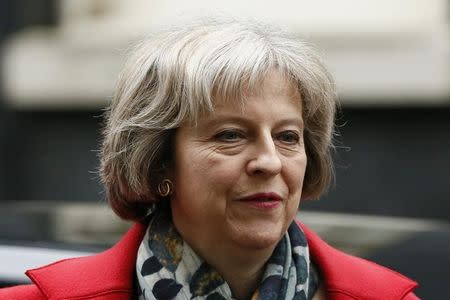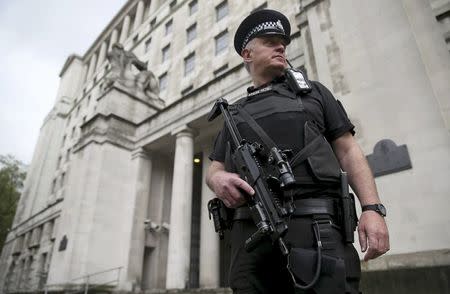Britain's MI5 raises threat level from Northern Irish militants
By Michael Holden LONDON (Reuters) - Britain has raised the threat level from dissident Northern Ireland militants to "substantial," meaning an attack on the British mainland is considered a strong possibility, Home Secretary (Interior Minister) Theresa May said on Wednesday. She said the decision by the domestic intelligence agency MI5 to increase its risk assessment from "moderate" reflected an ongoing threat posed by dissident Republican groups in the British province opposed to the 1998 Good Friday accord that largely ended three decades of violence. "As a result of this change, we are working closely with the police and other relevant authorities to ensure appropriate security measures are in place," May said in a statement. The 1998 deal drew a line under decades of shootings and bombings in England carried out by the Provisional Irish Republican Army (IRA), which was responsible for more than half of the 3,600 deaths during the violence designed to pressure the British government into relinquishing Northern Ireland. However, dissident factions who rejected that deal have continued to operate. In March, a group known as new IRA carried out an attack in Belfast which seriously injured a prison officer when a bomb exploded under his van. He later died from his injuries. The last attack on the British mainland occurred in 2001 when there were explosions in London, including a massive car bomb outside the BBC headquarters, and in Birmingham, central England. No one was killed. In its latest National Security Strategy last November, the British government warned that "violent dissident republicans aspire to target Great Britain, and some groupings remain capable of conducting one-off attacks, but currently consider Northern Ireland to be their main focus". Andrew Parker, MI5's Director General, has said there were 20 attacks in the province by dissident groups in 2014, but for each of these, the security services and police had stopped three or four others. Northern Irish police warned in March that they expected more incidents in the province to coincide with the anniversary of anti-British 1916 Easter Rising, the most dramatic chapter of Ireland's independence struggle. May said the threat level to the province itself from Northern Ireland-related terrorism remains unchanged at "severe," the second-highest level, meaning an attack is thought to be highly likely. The threat level to Britain from international terrorism remains unchanged at severe as well, she said. (Editing by Stephen Addison)



